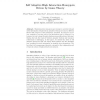Free Online Productivity Tools
i2Speak
i2Symbol
i2OCR
iTex2Img
iWeb2Print
iWeb2Shot
i2Type
iPdf2Split
iPdf2Merge
i2Bopomofo
i2Arabic
i2Style
i2Image
i2PDF
iLatex2Rtf
Sci2ools
126
click to vote
SSS
2009
Springer
2009
Springer
Self Adaptive High Interaction Honeypots Driven by Game Theory
High-interaction honeypots are relevant to provide rich and useful information obtained from attackers. Honeypots come in different flavors with respect to their interaction potential. A honeypot can be very restrictive, but then only a few interactions can be observed. If a honeypot is very tolerant though, attackers can quickly achieve their goal. Having the best the trade-off between attacker freedom and honeypot restrictions is challenging. In this paper, we address the issue of self adaptive honeypots, that can change their behavior and lure attackers into revealing as much information as possible about themselves. The key idea is to leverage game-theoretic concepts for the configuration and reciprocal actions of high-interaction honeypots.
| Added | 27 May 2010 |
| Updated | 27 May 2010 |
| Type | Conference |
| Year | 2009 |
| Where | SSS |
| Authors | Gérard Wagener, Radu State, Alexandre Dulaunoy, Thomas Engel |
Comments (0)

